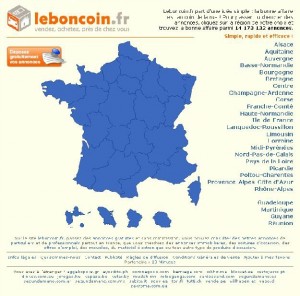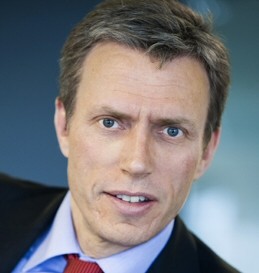Thirty percent of the company’s revenues now come from digital activities and 50 percent of its profits. One major part of Schibsted's strategy has been to capture classified space online, and not just in Norway where it is based. In 2008, the company’s international online classified advertising business was reorganized into a separate company, Schibsted Classified Media (SCM). Today the company has activities in more than 20 countries, most of them based on the successful Swedish Blocket.se concept. Just this past May the company launched the classified site Sahipasand in India, also based on the Blocket platform.
With the acquisition of No. 1 French classified site leboncoin.fr in September 2010, Schibsted Classified Media is one of the largest classified groups in the world.
Rolv Erik Ryssdal has served as CEO of Schibsted Media Group, publishers of VG and Aftenposten in Norway, Aftonbladet in Sweden, as well as the free papers 20 Minutes in France and Spain, since June 2009. He joined the company in 1991 and has held several management positions including CEO of Aftonbladet from 1999-2005, CEO of VG from 2005-2008, and CEO of Schibsted Classified Media from 2008-2009.
Ryssdal will be in his element when he speaks at the 63rd World Newspaper Congress in Vienna (12-15 October) in a session dedicated to Repositioning. Here he talks about Schibsted’s success and strategy in an email interview.
WAN-IFRA: It is clear that Schibsted has been quite assertive and successful in positioning itself for the future, particularly on the digital (classifieds) side. And in your Q1 2011 report, you stated that "subscription-based newspapers are thriving." Could you elaborate on this latter part, in terms of results and what has driven this thriving success?
RYSSDAL: We observe that during these days, our subscription-based newspapers are doing better than the single-copy sold papers. I think this is a result of several factors. Firstly, their circulation numbers are more stable because of the fact that they do not depend on being chosen by customers in the newsstands each and every day. They are delivered on the doorstep and chosen at one moment for a longer period of time. Economically, they currently benefit from a stronger advertising climate, at least in our Scandinavian markets. They have also been through some tough cost-cutting measures the last years and this has put them in a healthier economic position today. We are, however, a bit worried about the possible impact that the current slump in the financial markets might have.
 Schibsted acquired the French classified site leboncoin.fr this past fall.WAN-IFRA: Schibsted's recent acquisition of leboncoin.fr and the completed merger of Media Norge indicate the company's focus to diversify its activities, both abroad and locally, and strengthen its online classifieds presence... How are such investments paying off, and can we expect more expansion in the near future?
Schibsted acquired the French classified site leboncoin.fr this past fall.WAN-IFRA: Schibsted's recent acquisition of leboncoin.fr and the completed merger of Media Norge indicate the company's focus to diversify its activities, both abroad and locally, and strengthen its online classifieds presence... How are such investments paying off, and can we expect more expansion in the near future?
RYSSDAL: Schibsted’s strategy rests on two strategic pillars: One is our leading positions in print and online news in Norway, Sweden and internationally. The other is to become the leader in rapidly growing online marketplaces.
Several of our media houses are among Europe’s leading online newspapers and pioneers in the fields of web TV, mobile and paid online services. The industry know-how which Aftonbladet, VG and our other media houses possess about the interaction between established and new media forms much of the basis for our ambitions for future growth. Being at the forefront of the Scandinavian market gives us a good opportunity to export concepts and expertise to other markets within and outside Europe.
The export of tried and tested concepts in our home markets is an increasing part of Schibsted’s growth strategy. In recent years we have been systematically expanding our online classifieds business, both through acquisitions and organic growth. The online classifieds segment is a long-standing part of our business model, and these transformations will ensure that it continues to be for a long time to come. In 2011, we are investing almost 60 million euros in launching our online classifieds in new markets.
WAN-IFRA: Most newspaper publishers today rely on their print activities for the majority of their revenues... what advice would you have for publishers trying to weigh the balance of investing in a digital future and maintaining a strong print presence as well?
RYSSDAL: So far, the online media have not been able to fully compensate for the income generated by print. Nor have they been able to replace all the important work performed by the newspapers’ editorial departments. Like many other publishing executives, I am worried about the consequences for the funding of serious investigative journalism. Unfortunately, the resources that most newspapers have available for investigative journalism are declining. The burning issue of finding sustainable revenue models to finance important journalism must be resolved, and this is an important challenge not only for our own industry, but for the democratic societies that we have grown accustomed to in our part of the world.
One vital action to take is to start experimenting with ways to charge for online content. We must find sustainable payment models for our content. This is important for us at Schibsted as well.
It is difficult to advise other media houses how to manage the transition to digital growth because they have different traditions and characteristics. Some factors behind the transition we have been through at Schibsted have been the fact that we were early starters and had the belief and resources to strengthen our products during the dotcom crisis at the turn of the century. In addition to that, we were brave enough to cannibalize ourselves by establishing online classifieds companies in direct competition with our traditional ones in print. These factors have put us in a healthy position today.



